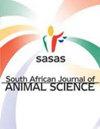角黄素和金盏花提取物对轻型蛋鸡生产性能和蛋品质的影响
IF 0.6
4区 农林科学
Q3 AGRICULTURE, DAIRY & ANIMAL SCIENCE
引用次数: 2
摘要
本试验旨在探讨75 ~ 85周龄轻蛋鸡日粮中天然(万寿菊提取物)和合成(角黄素)色素的最佳添加水平对生产性能、蛋品质和生产经济效益的影响。试验选用288只蛋鸡,采用完全随机设计,4 × 4因子设计,4个水平的万寿菊提取物(2.10;2.40;2.70;3.00 ppm)和4个角黄素(0.03 ppm)。40;0.70;1.00;1.30 ppm), 3个重复,每个实验单元6只母鸡。添加角黄素后,饲料产蛋率、产蛋量和产蛋率呈线性提高。雏鸡的蛋黄指数随金盏花和角黄素的添加量呈二次效应,在饲料中添加2.60 ppm/kg的金盏花和0.95 ppm/kg的角黄素时较好。随着万寿菊添加量的增加,蛋黄率和哈氏单位率呈线性增加,蛋白率呈线性下降。在对YolkFan DSM®和红黄度的评价中,色度(a*)对万寿菊(2.73和2.80 ppm/kg饲料)的添加呈二次效应,对角黄素的添加呈线性增加。由此得出,75 ~ 85周龄轻蛋鸡饲粮中添加2.60 ppm/kg金盏花提取物和0.95 ppm/kg角黄素时蛋黄指数最佳。本文章由计算机程序翻译,如有差异,请以英文原文为准。
Performance and egg quality of light laying hens fed with canthaxanthin and marigold flower extract
The aim of this study was to determine the best level of inclusion of natural (marigold flower extract) and synthetic (canthaxanthin) pigments in the diet of light laying hens from 75 to 85 weeks old in terms of effects on performance, egg quality, and economic viability of production. A total of 288 laying hens were used in a completely randomized design, with a 4 x 4 factorial arrangement, with four levels of marigold flower extract (2.10; 2.40; 2.70; 3.00 ppm) and four of canthaxanthin (0. 40; 0.70; 1.00; 1.30 ppm), with three replications and six hens per experimental unit. The feed conversion by mass of eggs, egg mass, and egg laying rate showed linear improvement with the inclusion of canthaxanthin. The yolk index showed a quadratic effect with the inclusion of marigold and canthaxanthin, presenting a better estimate with diets containing 2.60 ppm/kg of marigold feed and 0.95 ppm/kg of canthaxanthin feed. The percentage of yolk and the Haugh unit increased linearly with the rising levels of marigold, whereas the percentage of albumen decreased linearly. In the evaluation of the YolkFan DSM® and the redness/yellowness, chroma (a*) presented a quadratic effect for the inclusion of marigold (2.73 and 2.80 ppm/kg of feed) and linear increase with canthaxanthin. It was concluded that the best yolk index was with 2.60 ppm/kg marigold flower extract and 0.95 ppm/kg canthaxanthin in the diet of light laying hens from 75 to 85 weeks old.
求助全文
通过发布文献求助,成功后即可免费获取论文全文。
去求助
来源期刊

South African Journal of Animal Science
农林科学-奶制品与动物科学
CiteScore
1.50
自引率
0.00%
发文量
39
审稿时长
>36 weeks
期刊介绍:
The South African Journal of Animal Science is an open access, peer-reviewed journal for
publication of original scientific articles and reviews in the field of animal science. The journal
publishes reports of research dealing with production of farmed animal species (cattle, sheep,
goats, pigs, horses, poultry and ostriches), as well as pertinent aspects of research on aquatic
and wildlife species. Disciplines covered nutrition, genetics, physiology, and production
systems. Systematic research on animal products, behaviour, and welfare are also invited.
Rigorous testing of well-specified hypotheses is expected.
 求助内容:
求助内容: 应助结果提醒方式:
应助结果提醒方式:


